
‘Live’ Bullet is a live album by American rock band Bob Seger & the Silver Bullet Band, released in April 1976. It was recorded at Cobo Hall in Detroit, Michigan, during the heyday of that arena's time as an important rock concert venue. The album is credited, along with Night Moves, with launching Seger's mainstream popularity.

Robert Clark Seger is an American singer, songwriter, and musician. As a locally successful Detroit-area artist, he performed and recorded as Bob Seger and the Last Heard and The Bob Seger System throughout the 1960s, breaking through with his first album, Ramblin' Gamblin' Man in 1969. By the early 1970s, he had dropped the 'System' from his recordings and continued to strive for broader success with various other bands. In 1973, he put together the Silver Bullet Band, with a group of Detroit-area musicians, with whom he became most successful on the national level with the album Live Bullet (1976), recorded live with the Silver Bullet Band in 1975 at Cobo Hall in Detroit, Michigan. In 1976, he achieved a national breakout with the studio album Night Moves. On his studio albums, he also worked extensively with the Alabama-based Muscle Shoals Rhythm Section, which appeared on several of Seger's best-selling singles and albums.
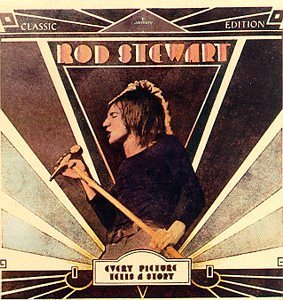
Every Picture Tells a Story is the third studio album by Rod Stewart. It was released on 28 May 1971. It incorporates hard rock, folk, and blues styles. It went to number one on both the UK and US charts and finished third in the Jazz & Pop critics' poll for best album of 1971. It has been an enduring critical success, including a number 172 ranking on Rolling Stone's 2003 list of the 500 greatest albums of all time.

Kid Rock is the sixth studio album by American musician Kid Rock, his fourth Atlantic Records album. It was released in 2003 and is his final release on Lava Records. It was critically acclaimed by Rolling Stone, which named it one of the 50 Greatest Albums of 2003. "Black Bob" and "Jackson, Mississippi" were recorded for his 1996 album Early Mornin' Stoned Pimp in 1995, but were left off the album. "Feel Like Makin' Love", "Cold and Empty", "Intro", "Hillbilly Stomp" and "Run Off to LA" were recorded for the demo sessions for 2001's Cocky, but did not make the cut as well. "Feel Like Makin' Love" originally had Sheryl Crow on the song. Country singer Kenny Chesney co-wrote "Cold and Empty".

The J. Geils Band is the self-titled debut studio album by American rock band The J. Geils Band. The album was released on November 16, 1970, by Atlantic Records.

Ramblin' Gamblin' Man is the debut album by American rock band the Bob Seger System, released in 1969.

Smokin' O.P.'s is the fifth studio album by American rock singer-songwriter Bob Seger, released in 1972. The album was reissued on CD by Capitol Records in 2005. It is currently the earliest Bob Seger album available on CD. The cover art is a parody of the Lucky Strike cigarette logo. Smokin' O.P.'s refers to Smokin' Other People's Songs, a derivation on the slang phrase "Smoking O.P.'s" meaning to smoke other people's cigarettes exclusively. Most of the tracks on this release are covers of songs written by other artists.

Back in '72 is the sixth studio album by American rock singer-songwriter Bob Seger, released in 1973. It was the first new album on Seger's manager Punch Andrews' label, Palladium Records, to be released under their distribution deal with the Reprise division of Warner Bros. Records and one of three early Seger albums that has never been reissued on CD.

Seven is the seventh studio album by American rock singer-songwriter Bob Seger, released in 1974.

Beautiful Loser is the eighth studio album by American rock artist Bob Seger, released in 1975. This album marked Seger's return to Capitol Records after a four-year split. His previous record with Capitol was Brand New Morning in 1971.

Night Moves is the ninth studio album by American rock singer-songwriter Bob Seger, and his first studio album to credit the Silver Bullet Band. The album was released by Capitol Records on October 22, 1976. Although the front cover only credits backing by the Silver Bullet Band, four of the nine songs on the album feature backing by the Muscle Shoals Rhythm Section.
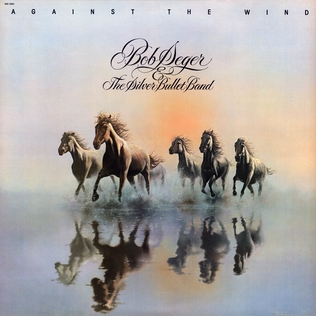
Against the Wind is the eleventh studio album by American rock singer Bob Seger and his fourth which credits the Silver Bullet Band. Like many of his albums, about half of the tracks feature the Muscle Shoals Rhythm Section as backing musicians. It was released in February 1980. It is Seger's only number-one album to date, spending six weeks at the top of the Billboard Top LPs chart, knocking Pink Floyd's The Wall from the top spot.
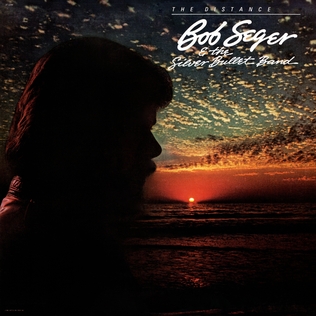
The Distance is the twelfth studio album by US-American rock singer Bob Seger. It was released in the final week of 1982. It peaked at #5 on Billboard's album chart and sold close to two million copies in the United States.
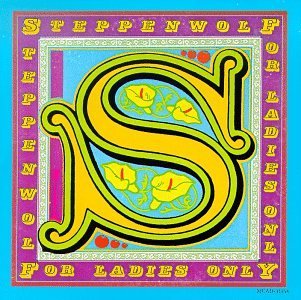
For Ladies Only is the sixth studio album by Canadian-American rock band Steppenwolf. The album was released in November 1971, by Dunhill Records. It is a political concept album mainly about feminism but with several more conventional songs about romance as well, both unusual themes for Steppenwolf. Some critics saw the album as sexist, citing the lyrics of the songs and a photo of a car shaped like a penis alongside the Hollywood Walk of Fame in the gatefold. The album saw the band hinting toward the progressive rock movement that was popular at the time with more complex arrangements and sophisticated keyboard playing, particularly on the title track. Like their previous album, it was accompanied by two minor hit singles which fell just short of the Top 40.

Killer is the fourth studio album by American rock band Alice Cooper, released in November 1971 by Warner Bros. Records. The album peaked at No. 21 on the Billboard 200 album chart, and the two singles "Under My Wheels" and "Be My Lover" made the Billboard Hot 100 chart.

Welcome is the fifth studio album by Santana, released in 1973. It followed the jazz-fusion formula that the preceding Caravanserai had inaugurated, but with an expanded and different lineup this time. Gregg Rolie had left the band along with Neal Schon to form Journey, and they were replaced by Tom Coster, Richard Kermode and Leon Thomas, along with guest John McLaughlin, who had collaborated with Carlos Santana on Love Devotion Surrender. Welcome also featured John Coltrane's widow, Alice, as a pianist on the album's opening track, "Going Home" and Flora Purim on vocals. This album was far more experimental than the first four albums, and Welcome did not produce any hit singles.
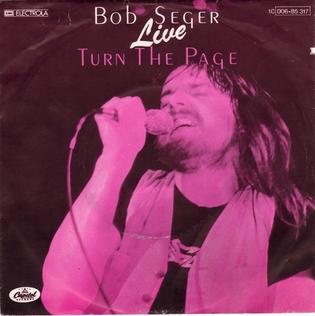
"Turn the Page" is a song originally recorded by Bob Seger in 1971 and released on his Back in '72 album in 1973. It was not released as a single until Seger's live version of the song on the 1976 Live Bullet album got released in Germany and the UK. The song became a mainstay of album-oriented rock radio stations, and still gets significant airplay on classic rock stations.

Greatest Hits is a compilation album by Bob Seger & the Silver Bullet Band, released in 1994. Certified Diamond by the RIAA, it is Seger's most successful album to date. In December 2009, Billboard and Nielsen SoundScan confirmed that with nearly nine million copies sold. Bob Seger's Greatest Hits was the decade's best-selling catalog album in the United States, even out-selling The Beatles' 1 and Michael Jackson's Number Ones. By September 2011, the album had sold a total of 9,062,000 copies in the United States.
"Lucifer" is a song written by Bob Seger featured on the album Mongrel. It reached #84 on the Pop Singles chart in 1970. Many Seger fans consider this to be one of Seger's best. Ben Edmonds, in his review of Mongrel, called "Lucifer" "easily the strongest cut on the record, and a great song in its own right. It's simple, straightforward rock: the band shows a clear comprehension of the song's rhythmical movement." The Bob Seger System performed this song on the TV show Upbeat, which was a syndication of musical performances taped at the WEWS studios in Cleveland, Ohio, with host Don Webster. In 2009, a clip of the song was used in the sixth-season finale of Entourage, episode "Give a Little Bit." In 2021, "Lucifer" was covered by Deep Purple, on their album, Turning to Crime.

First Kiss is the tenth studio album by American singer and songwriter Kid Rock. The album was released on February 24, 2015, through Warner Bros. Records and Top Dog Records, and is his first and only with Warner Bros. after leaving sister label Atlantic Records in 2014.



















